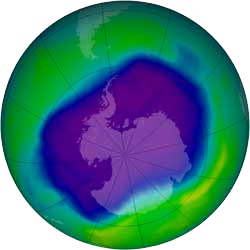Sat, Oct 21, 2006, 7:08pm
More reasons not to live in the Antarctic
Nature » Environment

J
ust when you thought this year was going to be a mild one for environmental problems, the ozone hole is torn to record new levels over the Antarctic. 10.6 million square miles. That's about 3 times the area of the US, if you imagine the US being hoisted up into the atmosphere for comparison.
Not that anyone should be thinking this year was a mild one in terms of the environment. Destruction of the ecosystem is continuing at a good clip by any standards, in case you were worried that there weren't people looking out enough for their own personal interests.
There is at least something to be said about what can happen when a problem is recognized and action is taken (from the article liked to below):

As a result of the Montreal Protocol and its amendments, the concentrations of ozone-depleting substances in the lower atmosphere (troposphere) peaked around 1995 and are decreasing in both the troposphere and stratosphere. It is estimated these gases reached peak levels in the Antarctica stratosphere in 2001. However, these ozone-depleting substances typically have very long lifetimes in the atmosphere (more than 40 years).
As a result of this slow decline, the ozone hole is estimated to annually very slowly decrease in area by about 0.1 to 0.2 percent for the next five to 10 years. This slow decrease is masked by large year-to-year variations caused by Antarctic stratosphere weather fluctuations.
So, good news is that it's shrinking. Note how long, however, it takes to undo the problem. There's a delay and a slow recovery period. We are in damage control mode on the ozone hole. Now think about such problems like global warming, where almost nothing is being done. It's not enough to wait for "all the evidence" to come in. By that point, you're already well into damage control mode, and it's far too late to avoid huge problems. There's certainly enough evidence already that we need to clean up our act.
Check out the NASA press briefing and their many other fine resources.
Not that anyone should be thinking this year was a mild one in terms of the environment. Destruction of the ecosystem is continuing at a good clip by any standards, in case you were worried that there weren't people looking out enough for their own personal interests.
There is at least something to be said about what can happen when a problem is recognized and action is taken (from the article liked to below):

As a result of the Montreal Protocol and its amendments, the concentrations of ozone-depleting substances in the lower atmosphere (troposphere) peaked around 1995 and are decreasing in both the troposphere and stratosphere. It is estimated these gases reached peak levels in the Antarctica stratosphere in 2001. However, these ozone-depleting substances typically have very long lifetimes in the atmosphere (more than 40 years).
As a result of this slow decline, the ozone hole is estimated to annually very slowly decrease in area by about 0.1 to 0.2 percent for the next five to 10 years. This slow decrease is masked by large year-to-year variations caused by Antarctic stratosphere weather fluctuations.

So, good news is that it's shrinking. Note how long, however, it takes to undo the problem. There's a delay and a slow recovery period. We are in damage control mode on the ozone hole. Now think about such problems like global warming, where almost nothing is being done. It's not enough to wait for "all the evidence" to come in. By that point, you're already well into damage control mode, and it's far too late to avoid huge problems. There's certainly enough evidence already that we need to clean up our act.
Check out the NASA press briefing and their many other fine resources.